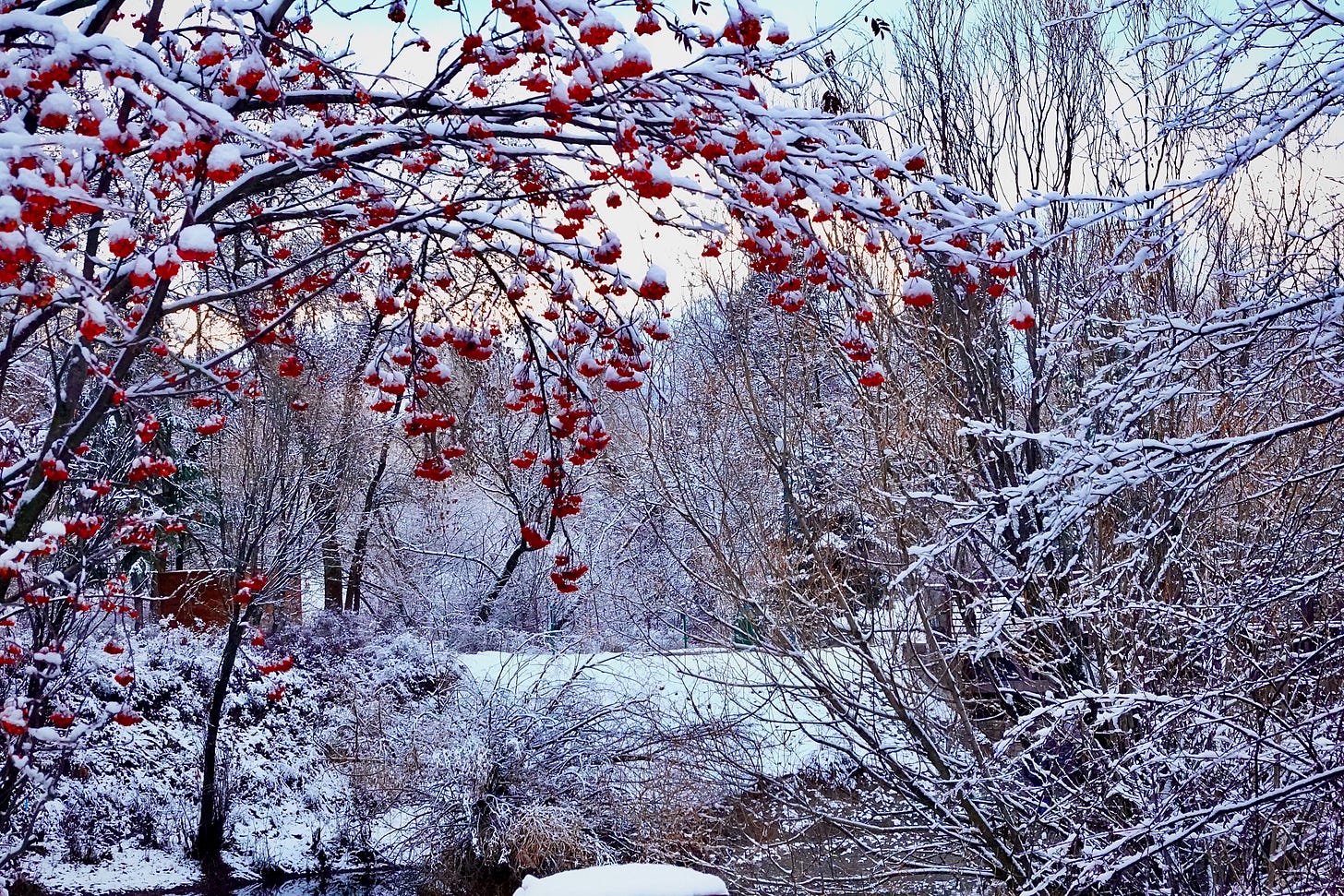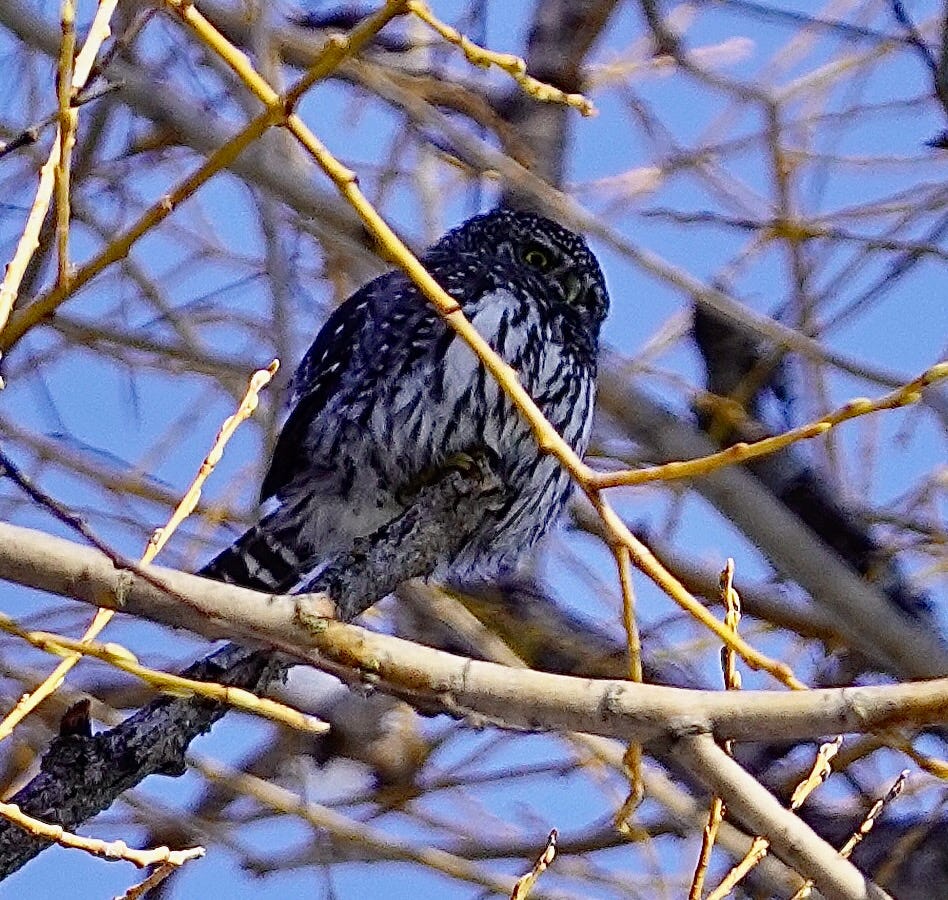Something about the way bunches of mountain ash berries receive and hold the season’s snow makes me feel like they have wings, or that I do. Aloft.
I grew up poor—or at least, poor for America. One of the chronically hungry kids in the classroom, in school after new school as we moved from town to town and rental to rental, scarfing down the mediocre free lunches that public schools provide to poor children. One of the kids whose hand-me-down winter coat was always too small, who never knew what a regular dentist visit was. Who read the same ten books over and over for years because that’s all I had and in almost every town we lived in the library was meager.
It is never not a luxury to me that I can buy my kids both new books and new socks.
In a way, my upbringing is a large part of why I didn’t hesitate to keep writing this newsletter while my book project on the topic, No Trespassing, was out on proposal, and kept doing it even after that book idea was turned down by mainstream publishing. It’s knowing in your gut—literally, when you never forget what it feels like to be hungry—what it means to live constantly on the edge, and how that knowing can lead you to think more deeply about what it means to share and to own, or to simply care for one another and be cared for.
On the Commons does not have a paywall. It did briefly, for less than a year after I enabled paid subscriptions. It took me a while to realize that the paywall didn’t make me uncomfortable because of the classic “artists have trouble asking to be paid for their work” mentality (although that is just as true of me as of anyone else); it was because throwing up a barrier to reading went against the very reason that I believe in this writing and research, some of which comes from my values and some of which comes from my life experiences.
I don’t have judgments about anyone else’s use of paywall—whether to have one, what to put behind it, and my focus here means that I mostly send more personal essays, the vulnerable stuff, the stuff I’d maybe reserve for a smaller and more invested audience here, elsewhere. But for On the Commons, I feel like there is too much to share, too much to know and learn, to lock any of it up.
I started writing about private property, ownership, and the commons in 2016, starting with this Aeon essay titled “Who owns the earth?” I’ve been obsessed with the subject ever since, and spent over a year working on a book proposal about the topic with my agent.
That book proposal did not make it past the publishing world’s barriers, but for reasons that at the time confused me. Two editors said the writing was comparable to Rebecca Solnit and Eula Biss but they couldn’t figure out the audience (thank you?). Several said that they were interested in it but the author (me) lacked a platform—which was true; I’d deleted my Twitter account in 2018 and my Facebook account in 2017, and have written for many major magazine and newspaper outlets but never had a staff position at one. One editor said he liked the proposal but was working on a very similar book with one of his authors. That was Simon Winchester’s Land. I read it when it came out and had . . . thoughts.
A few editors said they loved the idea and writing and wanted to read the book but couldn’t figure out how to “package” it. I have never quite gotten my head around that last one.
I wrote an entirely different book proposal, more of a memoir centered around Willa Cather’s novels and my move back to Montana, where I’m from. It’s not a bad proposal. It would be a fun book to write. And I have a great literary agent—she’s one of the few people who understands how my mind works and also understands the publishing industry (the fact that she’s also Robin Wall Kimmerer’s agent is just more evidence of her quality). She was on the cusp of sending it out to editors and I’m sure could have sold it.
But as much as I love Willa Cather—whose book My Ántonia I was named after—and enjoyed rereading all of her novels for that proposal, my heart wasn’t in it. It was here, in the messy, weird, almost always semi-hidden world of private property, theft of the commons, control of people, commodification of nature, and my growing understanding that the hoarding of wealth and power that enables injustices and economic inequality goes back not just centuries, but millennia. I read James C. Scott and Karl Polyani and Abdullah Öcalan and Sylvia Frederici and Rianne Eisler and Jack D. Forbes (if you haven’t read his Columbus and Other Cannibals, I strongly recommend it), and learned from all of them that the roots of what we face are far deeper than capitalism, far older than European colonialism.
I had started this newsletter with the idea that it would accompany the eventual book, which is still my intention, and I won’t go into the realities of my life that have repeatedly delayed my full dedication to that larger work. I’ve rewritten the first chapter five times. It’s a start!
I wrote an essay a couple of years ago about the creative commons and the paywall (this was when I still had a paywall), and in it I said that,
“I do think of this entire project as a kind of commons. I might be sitting here alone at a desk shaping narrative as best I can, but copyright law aside, nobody really owns these stories, much less the ideas that seed them.
What that means I’m not sure. I do know that, if you’re here with me, then I am equally here. With you.”
Some things in my personal life feel like they’re calming down, and I’ve been digging back into the more in-depth kind of research that has made up the core of this newsletter. If you find that this work brings you something of understanding and perspective in a difficult world, I hope you’ll consider supporting it with a paid subscription, if you can.
Following are some of the essays that will be coming in the next couple of months—and through all of them it remains true that if you are here with me, then I am equally here, with you:
The relationship between resource and power accumulation, informed by the work of Abdullah Öcalan (particularly The Sociology of Freedom) and my recent read of the book The Dissident: Alexey Navalny: Profile of a Political Prisoner.
Who gets to say no? No to exploitation, extraction, to commodification of soil or spices, culture and the sacred? Or even to research, as detailed in Linda Tuhiwai Smith’s book on research and Indigenous peoples, Decolonizing Methodologies. Who gets to define “the common or greater good”? It is very easy for power to force marginalized and less-powerful people everywhere into positions where there is only one “choice” that results in a chance at survival. Saying no isn’t always an option.
An updated and heavily revised version of one of my most commented-on essays here (which is saying a lot), on borders.
A revisit to commodification. I wrote about this briefly in a post or two or five very early in this newsletter’s life, but it has been a long time since I wrote directly to that issue. Commodification of local resources, whether they’re huckleberries or eider down or sand, are necessary to create the artificial scarcities that wealth and power hoarding—and by extension capitalism—rely on.
There will continue to be writing of wandering barefoot in the mountains, of unspooled time by rivers, of nights of moonfall, and maybe a sun halo if I’m lucky enough to run into one this year. And birdsong as the planet spins spring into my region of Earth. This is how I find enough centering and groundedness in an unstable world to tell the stories of property, and this is also how I stay sane.
I’ll try not to overwhelm you.
Comments are closed on this one. Take care of yourselves. 💚
In the spirit of Sarah Kendzior’s ability to investigate authoritarianism while nurturing a love for the world, and whose most recent Q&A I recommend if you’re feeling a lot of anxiety about imminent changes in the U.S.’s federal government, please enjoy this northern pygmy owl who was hanging out in my neighborhood last week.






